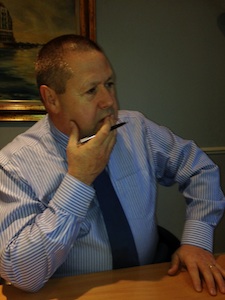The UK Category C machine market is edging away from the abyss thanks to common sense exercised by both the operators and the retailers in the negotiations which have taken place since Sceptre Leisure CEO Ken Turner announced its increase in rents in November of last year.

“But the industry is still in intensive care,” he said. Turner admitted that it was with considerable trepidation that he initiated the move to introduce an 8.7 per cent increase to Sceptre’s machine rents.
“I was, bluntly, apprehensive at the thought to going to our customers with such an increase against a background where historically the retailers have held the whip-hand in machine rental levels for so many years.
“But I felt that it had to be right because of all of the economic factors which made operating Category C machines in Britain today, bluntly, no longer a good business.
“The banks were reluctant to inject cash into the business to help fund operators’ purchases. Everything had gone up, from petrol to machine prices – everything, including the cost of living. On the other hand rents for machines had been rooted at 20-year-old levels.”
Turner said that two months down the line the entire picture had changed. “We are a long way from being out of the woods,” he said, “but the sector now has a chance. The operators were collectively heading towards the abyss and we had to convince the retailers that they would go over with us if something didn’t happen. We stepped back and they stepped back with us.”
But Turner said that he was impressed by the professionalism and understanding shown by the retailers. “We sat down with all of those not on contracts with us and when we laid out the problems of the industry, they were prepared to accept our position and help to rectify it. Every one of them co-operated and at Sceptre we have rent improvements of between eight and 12 per cent as a result.”
Those retailers – and the ones on contract with Sceptre – were aware that the November 2012 increases were only a step on the way to bringing profitability back to the machine sector “and are prepared to accept that.”
He added: “Now we can get on with funding our business properly and with confidence and the manufacturers will be in a far better position to undertake the research and development which is essential to helping our customers maximise the potential of their locations. That potential is further enhanced by the introduction of the £100 jackpot. Now the industry has something really tangible to work with.”
Turner was full of praise for the immediate awareness of the situation he was highlighting with his announcement in November, brought about by the assistance of the trade press. He was also quick to praise the support he received from his principal competitors, Gamestec and the Independent Operators Association, both of whom supported the Sceptre initiative within hours of its announcement.
There were problems remaining, he said, which were again historical and which would need to be addressed. “We collectively need to talk about the insurance issues. I spent £300,000 last year on repairing damaged machines. We should talk to the retailers about measures to secure their premises or insure them.
“We also need to consider the situation over machine consultants. I know that some of them do a good job, but in these days of modern accounting systems do we really need a third party there? It is something that the retailers should think about.”
Turner said that his company had been considerably strengthened by the acquisition of a substantial minority interest in Sceptre by the German machine manufacturing and operating giant Gauselmann Group.
“Their influence gave me the confidence to take this chance with our business. But they, like my board, were convinced that the proposals made common sense for all parties and I am much relieved that my customers saw it that way too.”
He said that Sceptre has around 20 substantial retailer customers and meetings had been held with all of them. “They all exhibited varying degrees of toughness, but they are all businessmen and could see the good business sense in the proposals and the way forward for the entire industry.”
He now felt that his company, and the entire operating sector, could now move forward into 2014 buoyed with the confidence that came from an industry now on its way back towards profitability, with goodwill on both sides and the means to ensure a long-term future for Category C.

